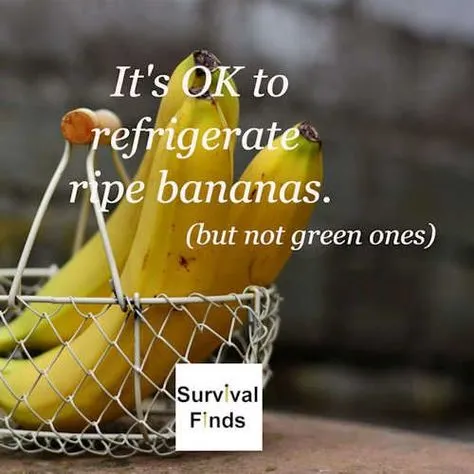The Science Behind Why Bananas Won’t Ripen: Explained and Tips for Faster Ripening
Have you ever bought a bunch of bananas, only to have them remain unripe for what feels like forever? It can leave you wondering why bananas won’t ripen like they’re supposed to. Luckily, we’re here to explain the science behind this mysterious phenomenon.

In this article, we’ll dive into what causes bananas to ripen, the factors that affect the ripening process, and the reasons why bananas may not ripen at all. We’ll also share some helpful tips on how to speed up the ripening process, so you can enjoy your bananas at their sweetest and most delicious.
Whether you’re a banana enthusiast or just curious about the science of fruit ripening, we’ve got you covered. So, keep reading to learn more!
What causes bananas to ripen?

Bananas are a fascinating fruit whose ripening process is influenced by a plethora of factors. At the core of this process lies ethylene, a gas produced naturally by the fruit as it matures.
When bananas are still green, they contain high levels of starch and low levels of sugar. As they begin to ripen, enzymes in the fruit start breaking down this starch into glucose and fructose, which gives them their sweet taste.
At the same time, ethylene emission from the banana increases rapidly. This gas triggers several physiological changes in the fruit such as softening of its flesh and change in color from green to yellow. Additionally, it stimulates production of more enzymes accelerating further breakdown of starch into sugars.
The rate at which bananas ripen can also be influenced by external factors like temperature and humidity. Higher temperatures speed up ripening while low temperatures slow it down. Similarly, exposure to moisture can cause rotting or mold growth on ripe fruits.
In conclusion, understanding what causes bananas to ripen is essential for proper handling and storage practices to maintain their quality and prevent spoilage. With this knowledge at hand, we can enjoy these delicious fruits at their peak without any waste or loss due to overripening or underutilization.
Factors that affect the ripening process of bananas.
Bananas are a delicious and nutritious fruit that are enjoyed by people all around the world. However, many people may not realize that there are a variety of factors that can affect the ripening process of bananas.
One important factor is temperature. Bananas ripen best between 60-70 degrees Fahrenheit (15-21 degrees Celsius). If the temperature is too hot or too cold, it can slow down or speed up the ripening process.
Another factor is humidity. Bananas ripen best in environments with high humidity levels. This helps to prevent them from drying out and becoming tough.
The presence of ethylene gas also plays a role in banana ripening. Ethylene is a natural gas produced by bananas as they ripen, and exposure to this gas can cause other fruits and vegetables nearby to ripen faster as well.
Finally, handling practices can also impact the rate at which bananas mature. Rough handling or improper storage conditions can damage the fruit and cause it to spoil more quickly.

By understanding these factors, individuals can better control the ripening process of their bananas and ensure they enjoy them at their peak freshness and flavor.
Reasons why bananas may not ripen.
Bananas are a delicious and healthy fruit that many people enjoy as a snack or ingredient in various dishes. However, there are times when bananas may not ripen as expected, leaving consumers puzzled and disappointed.
There are several reasons why bananas may not ripen properly. One of the most common causes is temperature. Bananas require warm temperatures to ripen, so if they are stored in a cool environment, they may take much longer to mature or not mature at all.
Another reason for unripe bananas could be due to exposure to ethylene gas. This gas is produced naturally by fruits during the ripening process and can cause other fruits nearby to also ripen quickly. However, if bananas are exposed to too much ethylene gas before they have fully matured, it can cause them to become overripe on the outside while remaining firm and underdeveloped on the inside.
Furthermore, the age of the banana also plays a significant role in its ability to ripen correctly. Bananas that were harvested prematurely will often fail to reach full maturity even under ideal conditions.
Lastly, certain varieties of bananas may simply be less prone to proper maturation than others due to their genetic makeup or growing conditions.

In conclusion, understanding why your bananas may not be maturing properly can help you make adjustments and avoid disappointment in the future. Whether it’s adjusting storage temperature or selecting different banana varieties altogether – there is always room for improvement when it comes to enjoying this delicious fruit!
Tips on how to ripen bananas faster.
Bananas are a staple fruit in many households, but there are times when they just don’t ripen fast enough. Whether you need them for baking or simply want to enjoy a ripe banana, there are tips and tricks to help speed up the process.
The first step is to separate your bananas from other fruits. Bananas release ethylene gas which can cause other fruits to ripen faster, so keeping them separate will allow them to ripen at their own pace.
Another way to hasten the ripening process is by wrapping the bananas in a paper bag. This traps the ethylene gas and speeds up the natural ripening process. Adding an apple or avocado also helps as they produce more ethylene gas which accelerates the process.
If you need your bananas ripe quickly, consider putting them in a warm area of your home such as near a sunny window or on top of your refrigerator where it’s slightly warmer than room temperature.
Finally, if you’re really in a hurry and don’t have time for natural ripening methods, try using an oven. Place unpeeled bananas on a baking sheet and bake at 300 degrees Fahrenheit for 15-20 minutes until they turn black on the outside. This method does alter the texture of the banana but is great for recipes that call for overripe bananas.
In conclusion, whether you’re looking to bake with ripe bananas or just want one ready to eat right away, these tips can help speed up that process without compromising taste or texture.
Check out our other articles to find out even more about banana.
So, now that you know what causes bananas to ripen and why they may not ripen as quickly, you have the tools to get your perfectly ripe bananas any time of year. Whether it’s finding a way to store or transport them correctly or adding an extra banana into the mix, with these tips are sure-fire ways for those looking for delicious yellow treats. Check out our other articles to find out even more about banana!













